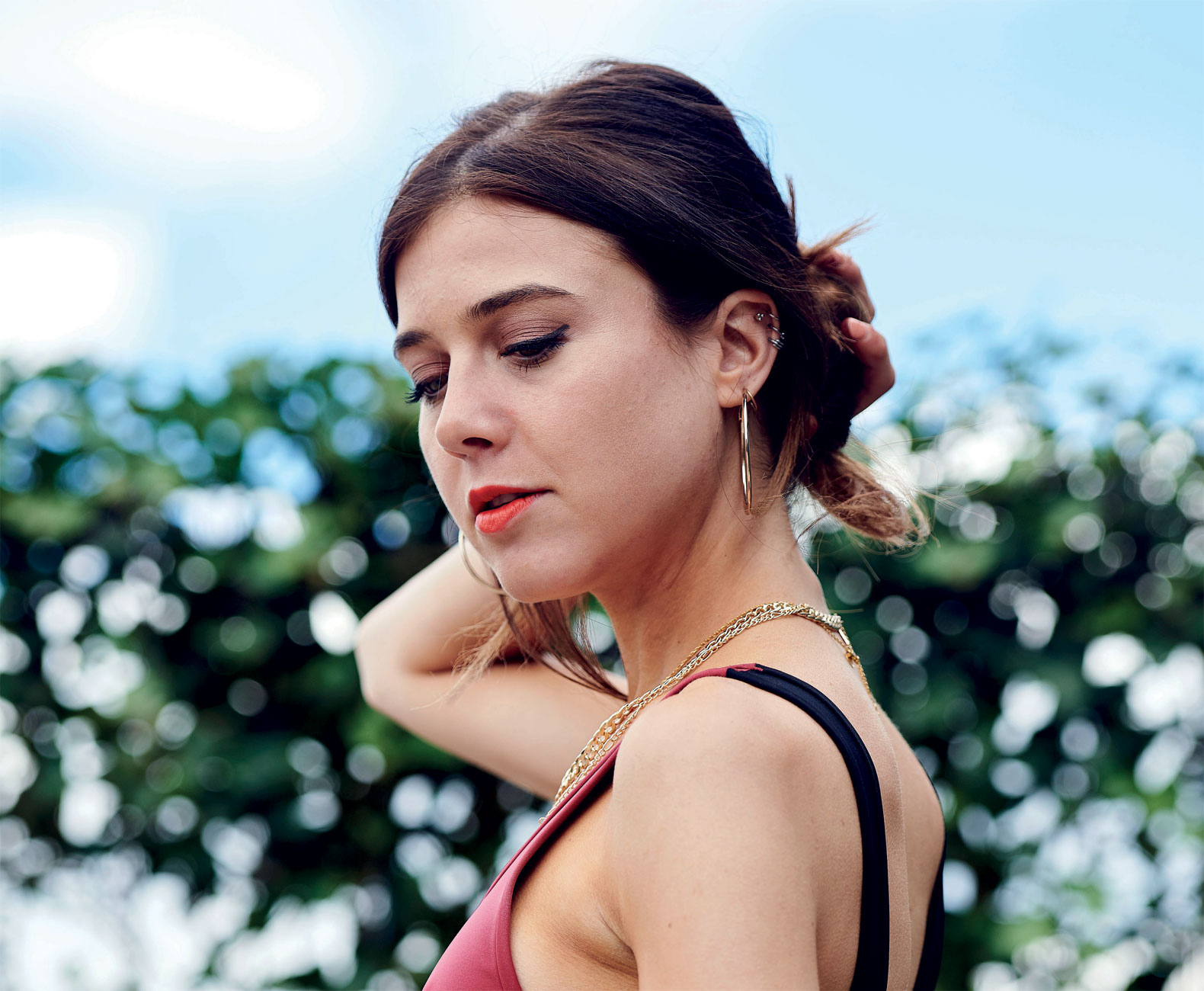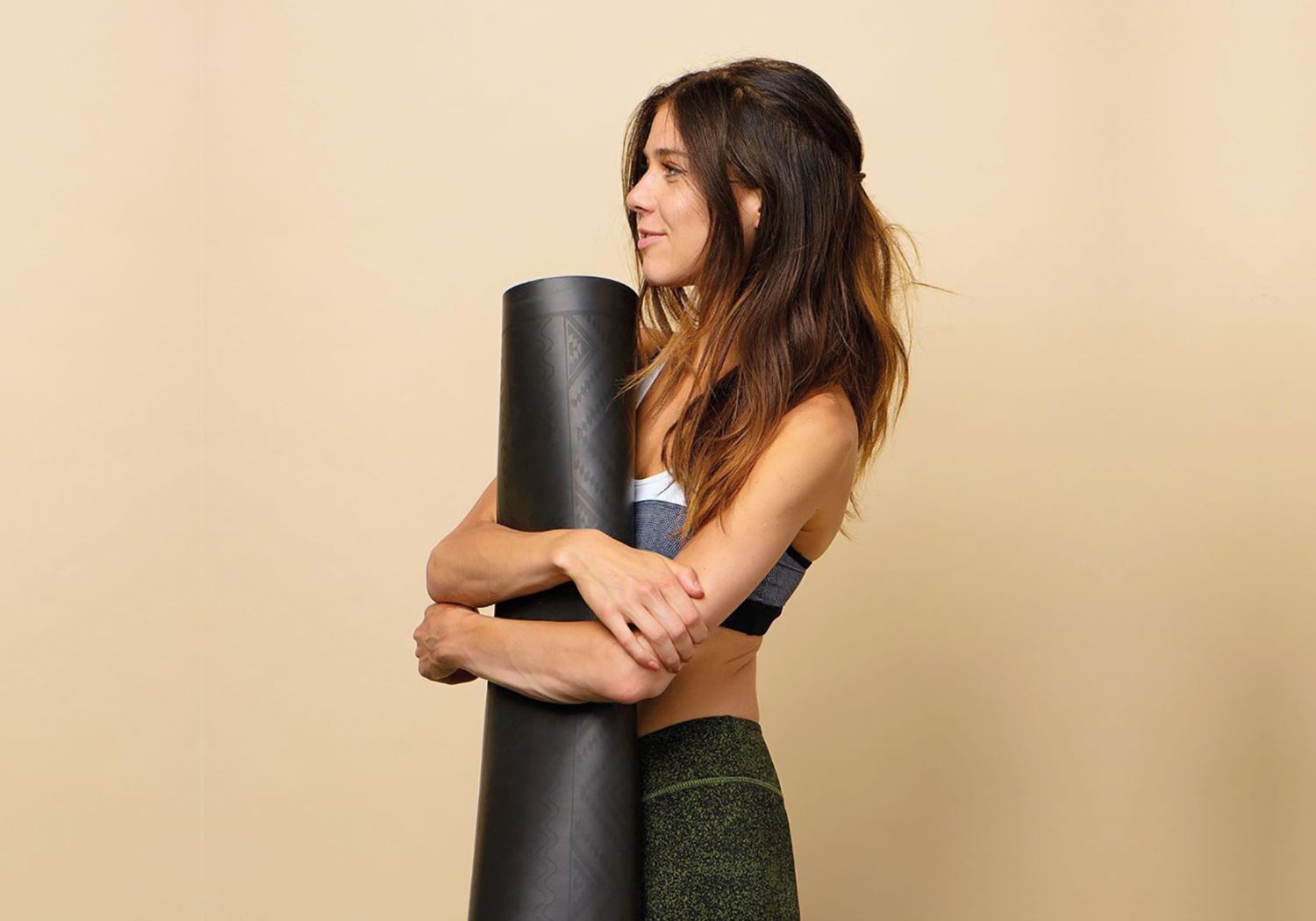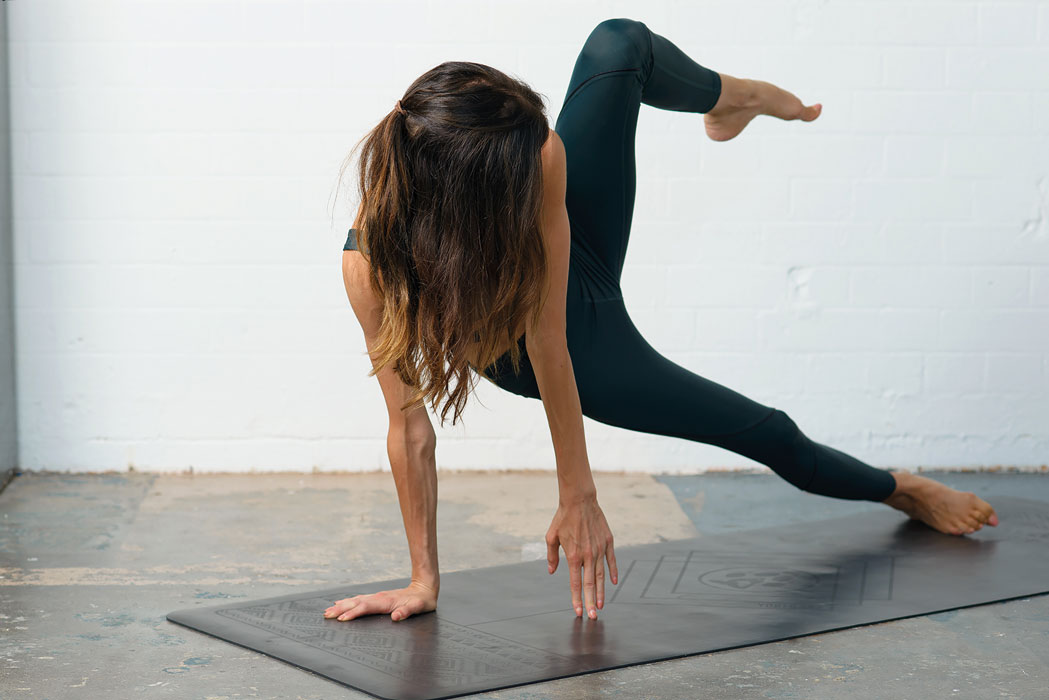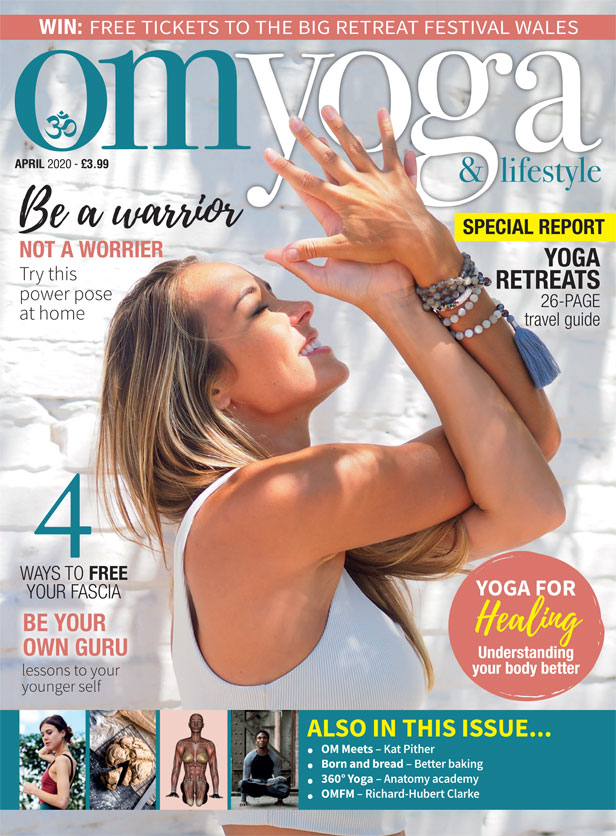
OM meets...
Kat Pither
OM chats to Kat Pither, founder of Yogi Bare, about what her practice means to her and on building a yoga business by accident. By David Holzer
When the Flow State album by trance music specialists Above & Beyond was released, it was possible to buy a deluxe ‘Flow State Yoga Bundle’ limited to 200 that included an ecofriendly yoga mat from a company called Yogi Bare. I’d never heard of Yogi Bare and was curious to discover how the intriguing collaboration between one of the giants of trance music and a start-up yoga gear company came about. I asked Kat Pither, founder of Yogi Bare, makers of eco-friendly yoga mats and props, to tell me her story and how she connected with Above & Beyond. I liked talking to her. She comes across as honest, open and full of enthusiasm. “Above & Beyond are authentic yogis, interested in the spirituality and history of yoga,” Pither told me. “They've been practicing for many years. This was a very exciting passion-led risk for the band. Quite a departure. And ours feels like an organic, real partnership.”
When Pither told me the Yogi Bare story, I realised that connecting naturally with people who love yoga is key to the success of her business. Pither, who is just 29, got into yoga when she was 16 and in rehab. She’d been recommended to try yoga and mindfulness to help her relax and overcome anxiety. Initially, she wasn’t keen. “I was so uncomfortable with the idea of sitting with myself.
Yoga and meditation always felt exotic and unrelatable to me and too physical,” she said. “Then I found a book on yoga by Vanda Scaravelli. I was fascinated. It was so poetically written. I started to study and practice quietly by myself. There wasn’t a lot else to do in rehab. That’s how my journey into yoga began.” Pither wanted to learn more about yoga so she trained as a teacher. “So many things fell into place for me. I stepped into my body, which felt old and new at the same time. It was a strange homecoming. Really special. I got the teaching bug and started doing spoken word at the end of classes as well, offering something from my heart. I was living just outside Cardiff in Wales then, where there was a small yoga scene.”
“So many things fell into place for me. I stepped into my body, which felt old and new at the same time. It was a strange homecoming. Really special.”
Launching Yogi Bare
Yogi Bare was born in 2016. How did Pither go from teaching to starting a business? “I’ve always been a maker and curious. I was that kid who wasn’t allowed in a shop because my mum was worried I’d break things. I got interested in ecofriendly materials and started researching them. Although I’m not from a business background, I thought I could sell stuff for a reasonable profit.”
The way Pither tells it, the rise and rise of Yogi Bare was unplanned. “Because I had no expectation of this becoming a proper business, I had so much fun with it. The name and logo made me laugh. They’re sweet and funny. I took all the photographs, made my own website. I didn’t push the mats I was making. A lot of my students didn’t know I had
a company on the side. I just started small, reinvesting my profits into making another mat in a different colour.”
Word of mouth also played a large part in the beginning. Students would ask Pither where she got her Yogi Bare mat. She gave mats away to other teachers because she wanted to support them. Teacher friends in other cities would use her mats and students would ask where they got them from.
When Pither began offering mats for events, awareness of the business spread even further. “It started out with 10 mats but every time I did a new batch, I popped in a sample. Whenever a friend was doing an event, I’d say, “I’ll cover you with mats”. More and more people discovered I had mats and I was happy to lend them. When it became cool to associate brands with wellness, my mats became even more popular. I went from 10 mats to having 200 circulating at festivals and things like BBC events.
My mats had a better social life than me!” From an awareness point of view, this worked perfectly. “The feedback was incredible. A good yoga mat can boost a student’s confidence massively. People would be at an event, try my mats and say, “Wow, these are awesome.” They bought into the brand because they tried it and it felt good.”
Although Pither also used Instagram and Amazon, they didn’t feel particularly aligned with who she was.

The organic approach, more her, worked far better. “I was just making friends with people,” she says. “It just happened that many of them were rather cool. For example, the marketing girl at Speedo was a friend of mine and she used my mats on a photoshoot.”
Pither’s approach may be organic but it’s also very much aligned with the way things happen in the world of conscious business. The collaboration with Above & Beyond came about after she met Annie Norman of the trio’s management company at a festival. “I said I’d been a fan of the band for a long time. She told me the band were fans of my mats. I gave them some and they fell in love with them. They asked me if I could make a special mat to go alongside the album that incorporated the organic shapes and imagery they were trying to conjure up.”
It looks like Yogi Bare’s relationship with A&B is set to continue. The first run of Flow State mats sold out “incredibly quickly worldwide”. A second run has just been created and is available on the collaborators’ websites. “I hope we're forming a real, genuine friendship,” Pither told me. “I know this won't be the end for them because it's a proper, proper passion.”
Today, Yogi Bare is a grown-up business, selling around 7,000 mats a year. The company sells all over Europe and will launch fully in the USA soon. Pither does custom mats like those for Above & Beyond and has just licensed the brand to a hotel group who are doing custom mats. But, according to Pither, the actual Yogi Bare organisation is still tiny and she does the marketing herself. This includes social media although she shies away from influencers. “I’ve never paid anyone to
use Yogi Bare and I never will,” she said. How Yogi Bare is marketed is the most important thing for her. “I just want to make people feel something real. I tap into my own experiences and emotions to do this.”
Learning from mistakes
A truism about business is that you learn from your mistakes. Would Pither agree with that?
“I’ve made so many mistakes. But, I agree, it’s okay as long as you learn from them.” She laughed. “I have made the same mistake all over again though. I’m not a natural businessperson. I think you either start a business with a plan or by accident, like I did. I’m only now making a proper business plan.”
Could she share a mistake with me? “This still makes me cringe but, in the beginning, I thought I had to do a pink mat for women. I made a pink, fluffy mat. It absolutely flopped. Why? Because I didn’t like it and I was never going to give it my heart and soul. That was an early lesson: don’t make things you don’t like yourself.
One of the phrases I use around the brand is that Nirvana lyric. ‘Come as you are…’. I also never look at what any of the other brands are up to. It only holds you back, like walking with cement in your shoes. So many of them are all the same anyway. I don’t get the feeling they’re going to come up with weird little ideas like I do.”
And what about advice for readers thinking about starting their own yoga business?
“Start for the right reasons, not just because you think it’s cool to have a business. Don’t wait for things to be perfect because they never will be. It’s like yoga. There’s never a right time to start. Business is messy, scrappy, and always changing. Yogi Bare has only now evolved to a point where I think that what I’m doing is acceptable. The reality of running a business can be hard and lonely. Talk to other businesspeople whenever you can. Look to see if there are little talks and meetups happening and go along. You’ll always feel good if you go.”
Grounding through yoga
For Pither, yoga is perhaps more important than it ever was but the way she practices has changed subtly.
“Because of my background, I can sometimes feel a bit like a helium balloon and get swept away into my own head, especially when the business is in a whirlwind. Now I really do understand that yoga is a concept that goes way beyond the mat,” she explains. “I’ve learned to appreciate the mental side more. A couple of years ago, I would never have thought I could breeze through situations the way I can now. I’ve stepped up my meditation and breathwork. Rather than being physical, my practice can sometimes be just sitting and feeling. If it is physical, it’s slow, subtle and juicy. I get into all the sensations rather than hammer myself with a 90-minute Ashtanga practice. Most of all, I feel the need to ground myself, to actually touch the earth. And I never forget how much yoga has given me.
Explore the world of Yogi Bare at: yogi-bare.co.uk

David Holzer is a writer and yogi. His online yoga for writers’ course at dailyom.com is called The Secret Writing Mantra. You can find out more about David and what he offers at: yogawriters.org




